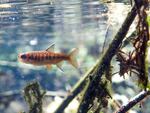
Oregon coast coho juvenile in the Siletz Basin
Conrad Gowell, Native Fish Society
A lawsuit filed Wednesday argues the Oregon Department of Forestry's logging practices are hurting protected coho salmon and violating the Endangered Species Act.
Five conservation and fishing groups are making the case in U.S. District Court that logging on steep slopes and road-building in the Clatsop and Tillamook state forests of northwest Oregon are damaging salmon habitat by causing landslides and erosion.
Noah Greenwald with the Center for Biological Diversity said dumping harmful sediment onto coho spawning grounds is a violation of the Endangered Species Act because the state doesn't have a Habitat Conservation Plan for the fish.
“Oregon Department of Forestry has been promising they’re going to do more to take care of streams and coho salmon for a long time, and they’ve just really not come through,” he said. "They continue to do a lot of logging on steep steep, landslide-prone slopes that lead to serious sediment problems in streams for coho salmon."
The state started working on a Habitat Conservation Plan for threatened coastal coho in the late 1990s, but the plan was never finished.
The five groups — including the Center for Biological Diversity, Pacific Coast Federation of Fishermen's Associations, Institute for Fisheries Resources and Cascadia Wildlands — are asking the court to prohibit certain logging practices until the state has a protection plan.
"We’re not saying they have to stop all logging," Greenwald said. "They need to fix their road system and they need to scale back their logging on steep slopes."
Logging on the Clatsop and Tillamook state forests is a key source of funding for area counties. Some counties have sued the state for not logging enough and denying them millions of dollars in revenue.
The Oregon Department of Forestry did not respond to a request for comment on Wednesday.
The latest federal recovery plan for coastal coho lists habitat loss and degradation as a key factor in rebuilding their population, which has dwindled to less than 100,000 fish in recent years.
